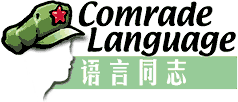|
Call
me old-fashioned, but since when did China so "quanxinquanyi"
de 的 (wholeheartedly) start embracing the "shengdanjingshen"
(Christmas spirit)? It seems to have happened overnight.
Chalk it up to "feisufazhan" 飞速发展 (breakneck
economic development), and the fact that every Christmas
light in the world is now produced in sweatshops in
Shenzhen. Believe it or not, the word "Shengdanjie",
which has come to mean Christmas, formerly referred
to the birth of Confucius. Next thing you know they'll
start eating turkey on the fourth Thursday of November
and dyeing Chaoyang Lake green for Saint Patrick's Day
(although nobody would notice the difference).
Whether we like it or not, Christmas has permeated China
faster than fake beanie babies, and is most likely here
to stay. Like any holiday, Christmas has its own unique
set of festive rituals, joyful customs, special holiday
delicacies, and traditional songs that make it what
it is (oh yeah, and then there's the religious significance).
Christmas has been imported to China practically lock,
stock and barrel from the West. But China is a unique
country with over 5,000 years of history. That's why
we need to have a "Zhongguo tese de Shengdanjie"
(Christmas with Chinese characteristics). Being that
most of this Christmas stuff is new to China, the Comrade
feels a responsibility to his fellow countrymen to offer
suggestions on how we can assimilate Christmas, thus
making it more familiar to the masses.
Typical stocking stuffers should include high-heeled
combat boots, fake fur-lined microskirts, cigarettes,
knitting needles, and cellphones. China's "Shengdan
Laoren" (Santa Claus) must be a Santa with Chinese
characteristics. The Chinese Santa should hail from
Heilongjiang province instead of the North Pole. He
should be dressed like a retired old cadre, his little
helpers should be Cantonese instead of dwarves, and
he should drive a pedicab (sanlunche 三轮车) pulled
by panda bears. Instead of a great big white beard,
he should have a salt -and-pepper Fu Manchu goatee.
Rather than leaving cookies out for him, children should
leave him a bottle of baijiu (moonshine). Since the
only chimneys in China lead to either a factory furnace
or a power plant, China's Santa should gain access to
apartment buildings through either the elevator shaft
or the stairwell.
It is also necessary to rewrite some familiar Christmas
carols and poems to be more appropriate for use in China.
Here is an example of a Christmas poem with Chinese
characteristics:
'Twas
the night before Christmas, and all through Beijing
Not a creature was stirring, within the Fourth Ring
The wazi 袜子 (stockings) were hung, all through the
hutong 胡同 (alleyways)
Laobaixing 老百姓 (the Masses) hoping this Christmas,
would be more than putong 普通 (average)
The children were sleeping twelve to a room
In hopes that Saint Nick, would be there quite soon
And Ma in her qipao 旗袍 (cheongsam)
And Pa in faux leather vest
And Grandma and Grandpa, had settled down for a rest
Then what to my bloodshot eyes should appear
But a flying 1.20 taxi, belching smog from the rear
Neither lively nor quick, the chuzuche 出租车 (taxi)
did go
With the driver repeating, Zenmozou? 怎么走? (Fiddlesticks!
Where do I go)? So up to the apartment roof the taxi
soon flew
Stocked full of baijiu guoji mingpai (international
name brand products), shouji (mobile telephones) and
the old geezer too
Down the staircase he stumbled, getting lost at each
turn
Dressed in torn tattered greys, and hair sticking up
firm
He spoke not a word, but went straight to the grog
Erguotou 二锅头 (rotgut) soon rendering his vision agog
And taking the gifts from his woven striped sack
He fell down the stairs, nearly breaking his back
He quickly came to and stood up on his feet
Thinking he'd really like something to eat
And remembering a hefan 盒饭 (box lunch) in the car
that he'd saved
He climbed up to the roof for the food that he craved
But I heard him exclaim just before he was gone
Merry Christmas to all, and to all a wan'an 晚安 (good
night!)
Merry Christmas and Happy New
Millennium from the Comrade!
|


